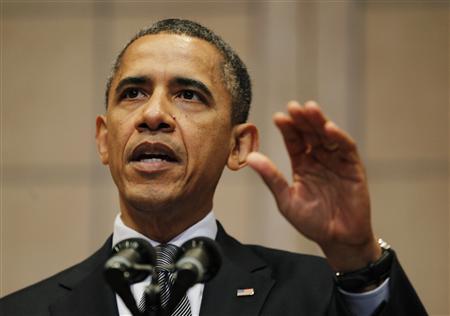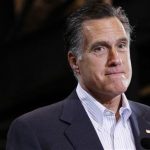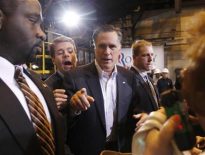(Reuters) – New signs of lower U.S. gas prices could give a boost to President Barack Obama’s
re-election hopes and blunt a potent weapon that Republicans have used to attack him.

in Washington, April 23, 2012. REUTERS/Jason Reed
News on Monday of a month long delay in the planned closure of the largest refinery on the U.S. East
Coast was the latest sign rocketing gasoline prices may have peaked.
Government data later showed national U.S.
gasoline prices have fallen for three straight weeks after surging earlier in the year, cooling fears they might hit $5 a
gallon this summer.
Industry experts say keeping Sunoco’s Philadelphia refinery open will ease supply concerns and
help underpin a gradual decline in gasoline prices.
That, in turn, would ease a burden on the U.S. economy that
Republicans have seized upon as one of their best bets of thwarting Democrat Obama’s bid for re-election.
The White
House says the president has limited ability to curb the global price of oil, which is the key determinant in the cost of
gasoline, blaming geopolitical tension and stronger growth in places like China and India.
But that has not kept gas prices from being a
significant issue in the run-up to the November 6 presidential election.
“Gas prices are a very politically potent
indicator,” said Karlyn Bowman at the American Enterprise Institute in Washington. “One of the things most visible to
(Americans) is gas prices. And should those go down, or remain stable, that has to be good news for the
administration.”
Obama currently gets some of his lowest poll marks for his handling of energy prices, which have been
buoyed by tensions in the Middle East, including concern that Israel may attack Iran to destroy its nuclear program.
An NBC/Wall Street Journal poll
last week showed Obama ahead of likely Republican challenger Mitt Romney by 6 percentage points but voters rated Obama lower
than his rival on handling of the economy.
Republicans show no intention of suspending attacks on the president’s
energy policies, even though prices at the pump have moderated.
“Until we are at the point where people don’t feel
like they’re squeezing their entire paychecks into the gas tank, it’s an issue that Republicans are going to keep talking
about,” said a Senate Republican aide.
Obama, seeking to deflect blame for gas prices, points to the rise in domestic
oil production on his watch, while calling for steps to reduce American dependence on foreign oil and seeking action against
market manipulators.
Republicans dismiss his strategy as an attempt to draw attention away from the problem, and Mitch
McConnell, the top Republican in the U.S. Senate, noted that gas prices had “more than doubled” under Obama.
“Yet
rather than do something about it, he blames it on the speculators and energy companies. Instead of increasing domestic
production, he’s focused on a plan to tax American energy manufacturers,” McConnell said in a statement.
‘PRICES
WILL COME DOWN’
Gasoline prices did not show an immediate reaction to news that Sunoco would delay shuttering the
330,000 barrel-per-day Philadelphia refinery and had entered talks that could potentially spare it from
closure.
“Prices will come down. They have started to come down and we will see them come down. But they come down
slowly,” said Philip Verleger, an economist who specializes in energy and has advised both Republican and Democratic
administrations.
U.S. government data on Monday showed that gasoline prices declined for a third consecutive week to a
national average of $3.870 per gallon and are now 7 cents lower than at the start of the month.
Geopolitical tensions
remain a wildcard for the future direction of oil prices. But the decline in retail gasoline prices reinforced industry
speculation that concerns over short-supply that had driven up prices were overblown.
Senior Obama officials say lower
energy costs are a welcome relief to households and breaking the straight-line climb in prices was good news for
everyone.
Asked about whether the drop in gasoline prices have lessened the need to tap U.S. emergency oil reserves,
Deputy Energy Secretary Daniel Poneman said: “We are very focused on energy prices … they are too high.”.
Obama
could certainly use the help of lower gasoline prices. Recent U.S. economic data has been mixed, including a disappointing
employment report in March, and the U.S. recovery remains vulnerable to another bout of volatility stemming from Europe’s
sovereign debt crisis.
The surge in gasoline prices toward $4 a gallon this year sapped consumer spending and hurt
confidence among Americans, many of whom rely heavily on their cars and have no easy way to avoid escalating prices at the
pump.
“It is the most visible price in the United States,” said William Galston, a senior fellow at the Brookings
Institution in Washington. “It is in your face, literally as you drive down the street every day.”
(Additional
reporting by Richard Cowan
and Ayesha Rascoe; Editing
by Bill Trott and Cynthia Osterman)





